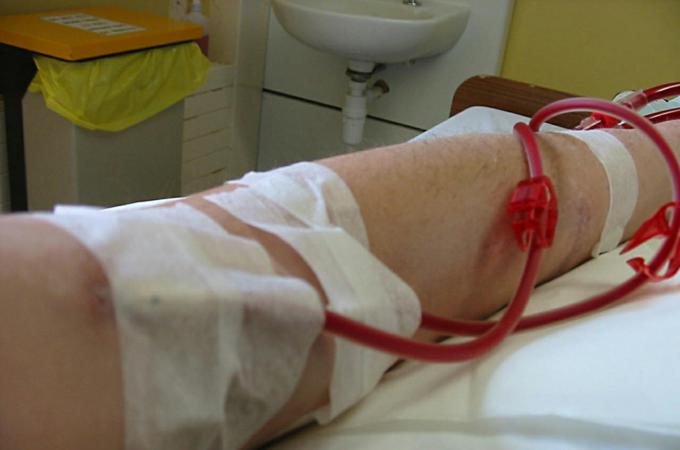Is dialysis required?
Q. My Dad is almost 89 years old. In 1987, he had a double bypass. Right now he has slow-growing prostate cancer, diabetes and high blood pressure. He is also suffering from depression (my mom passed away in 2010), and he looks forward to dying.
He found out recently that he has only 35 percent kidney function. If dialysis is prescribed, from a Catholic point of view, would he have to undergo it? (Knox, Indiana)
A. The short and simple answer is "No." In your father's circumstances, he would be under no ethical obligation to start dialysis. Catholic moral teaching does not require us to use every possible treatment to preserve and prolong life.
Dialysis, in this case, could surely be judged an "extraordinary" or "disproportionate" means in terms of the benefit it might offer.
This moral principle is most clearly expressed in the "Ethical and Religious Directives for Catholic Health Care Services" published in 2009 by the U.S. Conference of Catholic Bishops, which states: "A person may forgo extraordinary or disproportionate means of preserving life. Disproportionate means are those that in the patient's judgment do not offer a reasonable hope of benefit or entail an excessive burden, or impose excessive expense on the family or the community" (No. 57).
Your father can legitimately opt instead for what is sometimes termed "medical management without dialysis," involving palliative care to keep him as comfortable as possible.
Any moral decision depends, of course, on the attendant circumstances. If, on the other hand, your father were 30 years younger, with no life-threatening diseases, and dialysis were likely to offer him many more years of life -- and if, while in the throes of depression, he were motivated chiefly by a desire to end his life -- then the moral calculus might well produce a different result, and dialysis would be the proper moral choice.
I'm looking at your father's situation from afar and based on the information supplied. For your father's peace of mind, he might want to discuss his individual situation with a priest, Catholic ethicist or chaplain -- who, I am confident, would offer him this same comforting advice.
Q. A couple of weeks ago, a clean but scruffy fellow came into Mass and sat on the floor in the back of our church. When it came time for the sign of peace, he came forward to shake hands and people were a little put off. Then, when Communion came, he approached the altar before anyone else had left their pews.
A church usher quickly got behind him, gave him a "look" and then followed him to the back of the church. I thought this was un-Christian and felt sorry about the treatment he received. What if it were Jesus? (Wisconsin)
A. Within any group setting, there is a natural awkwardness when someone's appearance or behavior departs from the ordinary. As you rightly indicate, though, the Christian community is not about appearances. The man should not have been judged for his "scruffiness," and when he came up for the sign of peace, he should have been greeted warmly and with acceptance.
But the fact that he sat on the floor and that he approached the altar prematurely did create a natural concern. Perhaps the usher feared that the man posed a threat to the priest-celebrant -- although the "look" was clearly out of place.
The response of the worshipping community was, I hope, generally one of sympathy for the man with a desire to offer him assistance should he need it. I hope, too, that the usher, having followed the man to the back of church, engaged him in conversation to help determine his needs and to assure him that he was welcome.
- - -
Questions may be sent to Father Kenneth Doyle at askfatherdoyle@gmail.com and 30 Columbia Circle Dr. Albany, New York 12203.
- Father Kenneth Doyle is a columnist for Catholic News Service



















